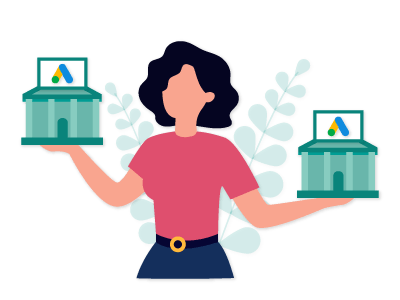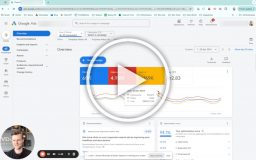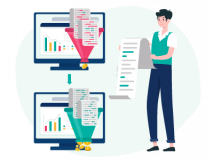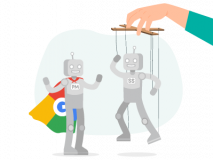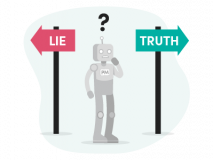The following is 100% my very subjective opinion based on onboarding roughly 4000 clients at White Shark Media, coaching hundreds of advertisers, starting a new agency focusing on PPC for large eCommerce clients, as well as having a vast network of other agency owners.
Let me start by saying: I don’t think an agency is for everyone.
I think many advertisers have been screwed, or more nicely put, taken advantage of, by an agency. This means many advertisers don’t have fond memories of dealing with an Google Ads agency.
So why is this? What is it with the PPC world that allows agencies/consultants to screw clients over?
First of all, the idea that you need to wait 6 to 12 months to be successful (the period gets longer the better the salespeople in an agency are) is absolutely ridiculous.
Second, most agencies will take on any client they can get. I challenge you to call any agency and ask if they can help you. Ninety percent of the time they will tell you of course they can – even without seeing your account and knowing your business.
Third, the barrier for entry in the PPC space is hilariously small. Anyone can, and will, create a WordPress site, pick a $99 theme and list how many years they’ve used Google as their “PPC experience.”
As a non-industry expert, you have no idea how to navigate the market. Most PPC marketers can speak well, and if we can’t, we’ll throw enough industry terminology around to confuse the heck out of you.
But with that little rant cast aside, when you should actually hire an agency?
We will go into depth with what you should be on the lookout for, and how to find a good agency in the end.
Note: This blog post is mostly aimed at mid-to-large advertisers. It can be tough for smaller advertisers who can’t afford the good agencies to be as vigorous in their selection process as mid-to-large advertisers.
Signs You Should Hire an Google Ads Agency
The traditional/easy reasons to hire an Google Ads agency are:
- Not enough time to work on the account in-house
- Not having success with PPC
- Missing expertise in-house
The more interesting reasons why you should hire an agency are:
Performance shouldn’t be an indicator. This one is a little tricky. Just because your performance is pretty good doesn’t mean you’re reaching your full potential.
At SavvyRevenue, we’ve onboarded many accounts that were doing well, and taken them to the next level. This isn’t unique to us, as I know plenty of colleagues in other agencies have done the same.
Agencies have advantages and experiences which enables us to squeeze every cent out of an account in a way you simply can’t do on your own.
New products, brands, and entire categories aren’t advertised other than in Shopping. This is a basic mistake, but I see it time and time again. New products/categories are not being advertised in Google Ads.
For certain advertisers, an agency can provide a significant performance boost by creating an index of the inventory and comparing it to whether keywords/campaigns are covering every single product.
Not everything we do is glamour and growth hacking. Simple still outperforms complex if complex doesn’t get it done.
You only run Search and Shopping campaigns. If you’re not running Dynamic Search Ads and Dynamic Remarketing with a profit, then that is also a good sign that you’re not taking full advantage of your potential.
Furthermore, a mature account should at least have tried to venture into Display.
Shopping is vastly outperforming your Search campaigns. I see this again and again. Google Shopping has a high ROAS, and it’s like advertisers have just come to terms with the “fact” that they’ll never do better.
Your branded keywords are more than 50% of your Google Ads revenue. This one is a bit more nuanced as different markets behave differently, but…
Once you start seeing your own company name account for more than 50% of your Google Ads revenue, then it’s worth figuring out whether your non-branded keywords are really providing any benefit on their own.
Your DSA campaign is in top 5 of your campaigns with the highest traffic. I see this again and again. Your DSA campaign is supposed to be a supplement to your regular Search campaigns – it’s rarely, if ever, supposed to be the main driver of revenue and traffic.
The Challenges of Working With the Wrong Google Ads Agency
Working with a bad, or even just an average agency, is not all roses and butterflies. There are significant challenges that even some of the best agencies in the world will show signs of. Here are a few signs you are working with the wrong Google Ads agency.
They aren’t transparent: This goes for both their fees and their work.
I’m not an advocate of asking your agency to create a log of every change they make, but you should be in the know of the overall direction of the account, how it’s progressing, and whether it’s working.
They don’t have a plan: Yikes. For me, this is huge. Many Google Ads agencies will work without having an actual plan.
I honestly don’t care if the plan is just to maintain and work on improving the existing setup, but there should be a plan.
If your agency doesn’t have a plan, then talk to them about creating quarterly plans. This will significantly increase the transparency, as well.
They get too happy with a ROAS result and become stagnant. This post isn’t supposed to be a promotion for SavvyRevenue, but throughout my years I have made many of the mistakes on this list and have therefore spent a great portion of time coming up with solutions.
One of the best things I’ve ever done is to instill a culture that it’s OK to ask if we can change the target.
For instance, we were running a campaign for an apparel store. We had been running at 12x ROAS for several months, but as we were moving into their low season, we could see that the ROAS was falling below 9x. At the same time, the traffic volume and revenue was actually still significant.
Instead of just decreasing bids and preparing for the low season, we proactively asked the client if they were fine with an 8x ROAS during their low season if we could still push close to the same amount of revenue as before.
They said yes, absolutely!
This isn’t always the case. We’ve several times asked the question and received a no. The big thing here is to ask.
At the same time, this is also where you should look at your advertising from a business standpoint and bring up the subject with your PPC team.
They don’t have the same drive for growth as you do. It’s tough to sync with an agency that doesn’t have the same desire for growth and flexibility. Most agencies have a set process they follow, and asking them to break that process will destroy their efficiency.
If you are on a steep growth trajectory, then consider finding an agency with a track record of being able to pursue rapid growth. Adding or adjusting your strategy frequently can be the name of the game for fast-growing brands, but many agencies are unable to keep up with that pace.
It’s like having kids; You need to constantly be watching. Sad but true. In most cases, you need to be constantly pushing your agency.
As an agency owner, and active PPC manager, this can be annoying beyond belief, but I also recognize that it helps push an agency.
You’ve been assigned to the wrong PPC manager. Don’t let anybody tell you that even though you’re assigned to a bad or new PPC manager, then having an awesome PPC Supervisor providing the oversight is just as good.
Most of the testimonials in an agency are generated by the top two to three PPC managers in the agency.
So when you see all those amazing logos, glowing testimonials and happy clients? They might just be the cream of the crop, and you’ll be assigned to a junior PPC manager who knows just slightly more than you.
Happens. All. The. Time.
And honestly, having worked in the industry for a long time, many testimonials aren’t updated. On a number of occasions, we’ve onboarded clients that have provided testimonials to other agencies and still do. It’s more common than you might think (Note: call references!).
You Should Not Hire an Agency in These Scenarios
There are several scenarios where you will not get enough out of hiring an agency. I’ve listed the most common scenarios below.
You have the talent in-house. This is less frequent, but if you have an excellent PPC manager in-house, then you shouldn’t hire an agency. Consider having an agency on a retainer as an advisor or helping with the quarterly plans.
Your budget is small, so the agency’s fee will be a large percentage of your spend.
Honestly, working with large clients is a win-win. For a large client, we’ll charge between 9 to 14% of ad spend (as of 2018). That generally means we need to improve ROAS, or profit, by 9 to 14% for our clients to break even on their fee.
That’s very achievable in most cases.
Smaller accounts have it much tougher. If you engage a decent agency at a $1,000 a month and your ad spend is $3,000. Well, then they have to improve ROAS by 33% to just break even after they’ve come on board.
Your performance is good, and you’re not ready to pay top dollar for an agency. I’ve seen this in the past, but not as much lately (maybe because we post our pricing on our website?).
Good agencies charge what they’re worth because they bring a lot of value.
If you’re only trying to pay a $1,000 or $2,000 a month for a major account, then there simply will not be enough for the agency to make it work. You’ll end up only attracting poor agencies, which will f*** up your account.
If the math doesn’t make sense. When you hire an agency it should be to make more money. You can make more money by one of the following equations (or a mix):
- The increased profit exceeds the added cost to the agency
- The value of the decreased internal resources you have to assign exceeds the added the cost to the agency
That’s basically it. If the agency can review your account and carefully predict that they can improve your account by XYZ and it exceeds the added cost, then it’s a no-brainer, IMO.
For some accounts, this is very easy to predict while others that are well-managed are much tougher. So don’t be hellbent on whether this is possible to predict, but if it is (and the agency can actually explain in broad strokes why they think they can do it), then it just makes sense to go with an agency.
The Benefits of Working with the Right Google Ads Agency
We’ve been through the signs of when you should steer clear of working with an agency, and now the time is to find all the benefits of working with the right agency:
They have access to multiple accounts, which means they will be able to spot trends faster.
I’ve always claimed this to be one of my top competitive advantages. Being able to spot trends across accounts and use those insights is monumental.
This isn’t like “Oh, this keyword works in account A, let’s use it in account B as well”. No. That’s for newbies.
We’re talking insights like:
For luxury brands, including a higher from-price in the ads usually draws in fewer visitors, but they convert at a higher rate and has a higher average order value.
For stores with high-valued products, you should be careful with pursuing the daily or even weekly fluctuations. Often a couple of high-value transaction in a day can offset several weeks of poor performance.
The right agency has experience, and have most likely seen whatever your challenge is before.
Boy, do I think this is a big advantage. Having seen what works means I can suggest an approach that is most likely to work from the start.
As a contrast, I’ve always been reluctant to go ALL IN on content marketing – especially in SavvyRevenue as I haven’t really seen the success before. The theory sounds amazing: Post high-quality content, generate a lead magnet/course /webinars, promote aggressive with ads and organically on social media, collect email addresses → and the results will come.
I just haven’t seen it before. Therefore I’m reluctant to do it.
With Paid Search, I’ve not only seen but also done it many times before. I know precisely what secondary metrics to review to ensure we’re on the right track. In other words, I know what’s coming if we do it right. And that’s a huge advantage of taking an agency in.
Higher performance.
Well, obviously 🙂
Ability to get out of the daily drum.
With the right agency partner, you can stop working on executing the strategy (which your team is most likely not great at anyway) and focus on where you have the most significant impact.
Ability to focus solely on the one task at hand without being distracted by the 1000s of other things you have to do daily.
For smaller accounts, this isn’t really a thing. But when you get to +100 campaigns, then just getting the basics right can be a challenge for the average PPC manager.
In a specialized agency, this is all we do. We get in deep in the accounts, and the performance follows.
Access to software and processes that you normally couldn’t afford.
PPC software is often ridiculously expensive. Ranging from 0.5% to 20% (!) for certain PPC management software off the bat, then it’s impossible to make your money on much software.
This is where an agency has an advantage. We most likely will run the majority of our clients in the same software and tools, which allows us to negotiate a much better rate.
We’re often also much less high-maintenance, which allows us to negotiate much further down than you’d ever be able to do.
We were able to negotiate one of our favorite tools down from $120,000 a year to $24,000. And that’s while we’re still relatively small. This was only possible because we took away all main support because we didn’t need it.
How to Discern The Awesome Agencies from The Charlatans
I could write an entire book on this subject, but I’ll keep it very simple:
1. Call references.
Personally, I get a bit surprised when a potential client asks to talk to our references. On one hand, we post so much content and have testimonials in writing from some of our best clients.
However, I acknowledge that they can be fake (you’d be surprised how many of them are). Or they can be generated from one person’s work in the organization.
So call references and not just any references. Call references on the person that will be managing your campaigns.
It’s not useful get a testimonial of how good the founder or the top PPC manager is if you’re assigned to a junior PPC manager.
You need to hear how well people think of the actual person who will manage your campaigns.
Which leads us to point number two:
2. Meet the PPC manager who will be in charge of your campaigns.
This part will ensure that the person you’ll be spending the most of your time with actually understands your business and that you don’t get stuck with a PPC “expert” who has been in the industry for three months.
3. Get a plan before you start, and expect to pay for it.
The right agency might/should ask you to get paid for this part. But unless you know the agency very well, then have them create a plan for the work they will do before they get started. This will discern the people who talk a big game from the ones who actually know what they’re doing.
This part will take time, so be prepared to pay their rate for this task. If you’re not ready to pay for it, you can often still get an overview of their strategy or the direction they want to take, but it will have much less detail.
If you trust the agency, either by reputation, content, testimonials, etc. then you can skip this part, and go straight to the paid engagement where they will also have the strategy/plan as part of the retainer.
The Bottom Line: Your Profits Must be Higher After Paying the Agency’s Fees
At the end of the day, hiring an Google Ads agency is really just a math problem. If you engage an agency and can see that they will have to grow your account by 200% just to break even on their fee, then chances are that you will never profit from having an agency onboard.
Remember to include any costs you have now (your time, your team’s time, software, etc.) into your profits calculation. So if your team spends 10 hours on PPC a week (40 per month) at an internal hourly rate of $40, then you should “discount” the $1,600 when calculating how much they have to improve your account before you make your money back.
It might take some time to get the profitable level (three, maybe six months max in most cases), but under no circumstances should you make less money than before.
Set the bar high. Getting good results from PPC is not rocket science if you have a good business. However, scaling and growing accounts profitably month after month is hard — really hard— and long-term success requires more resources than just building a strong PPC program.
